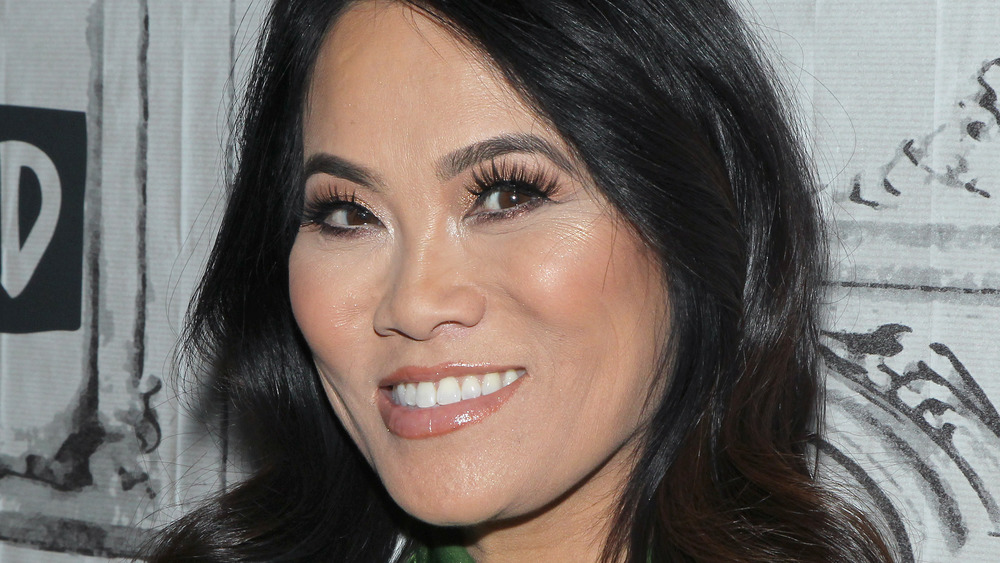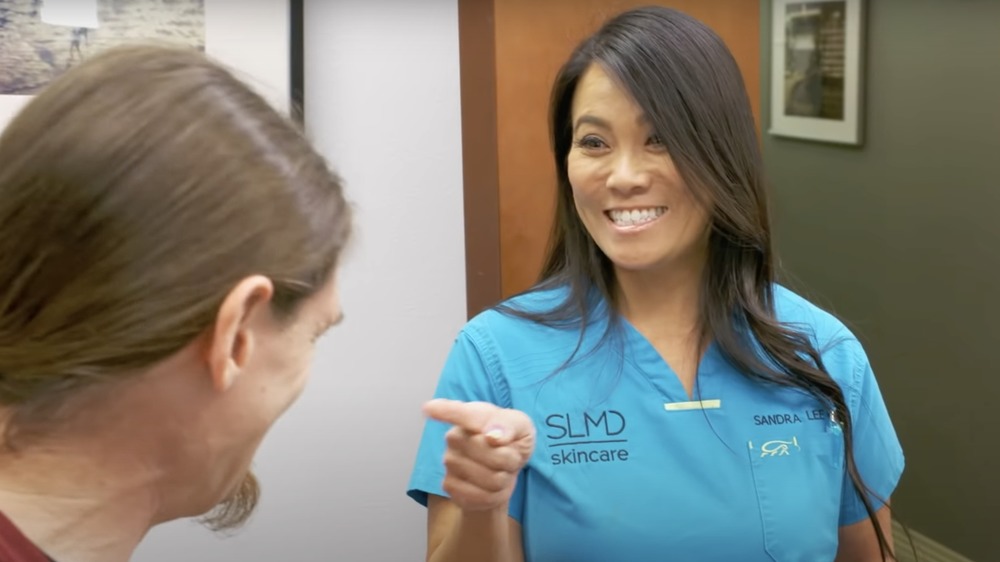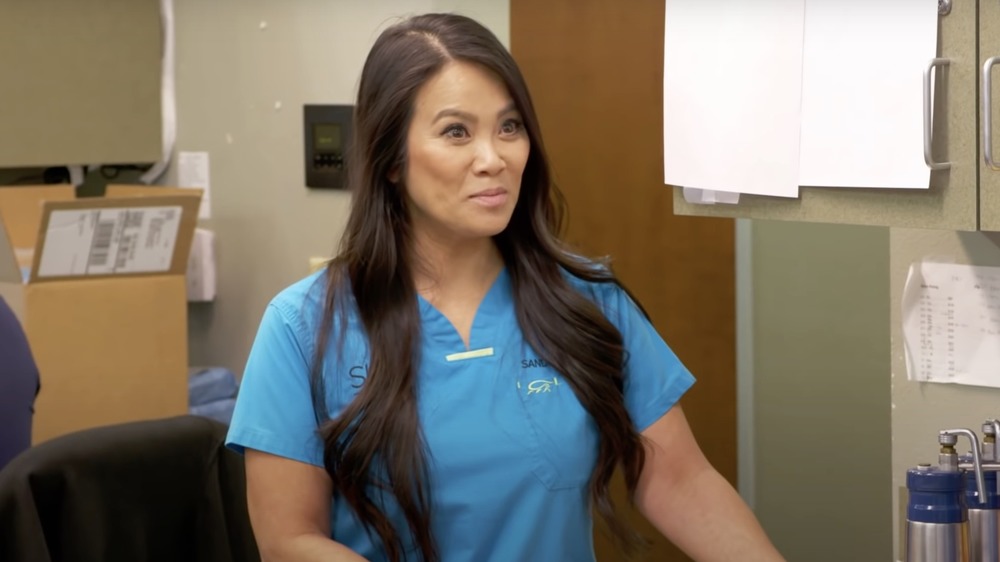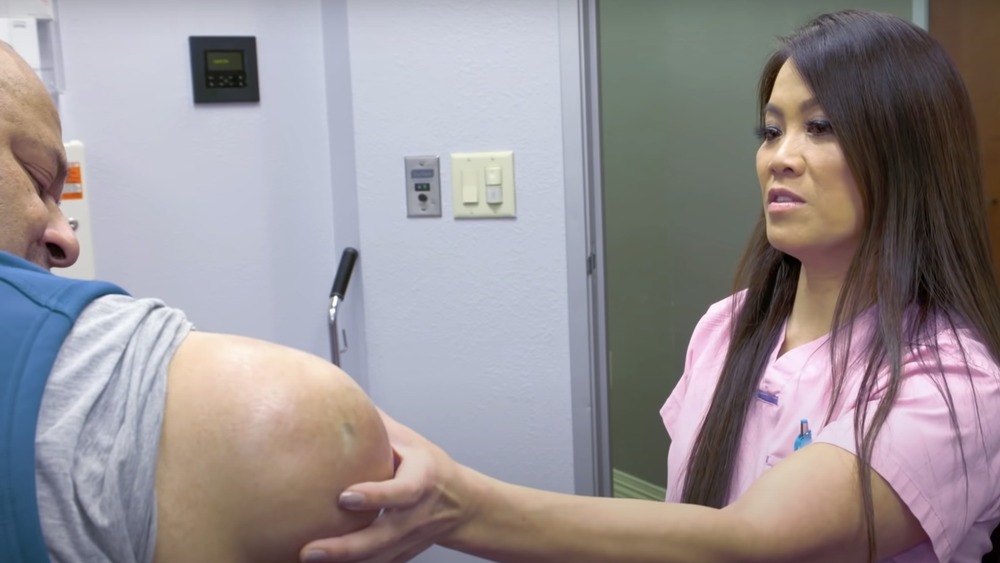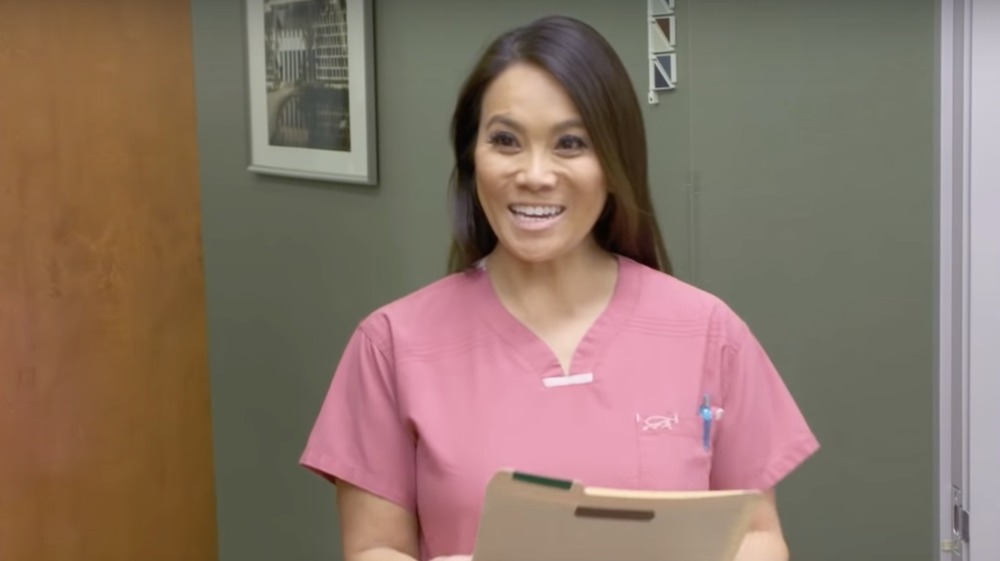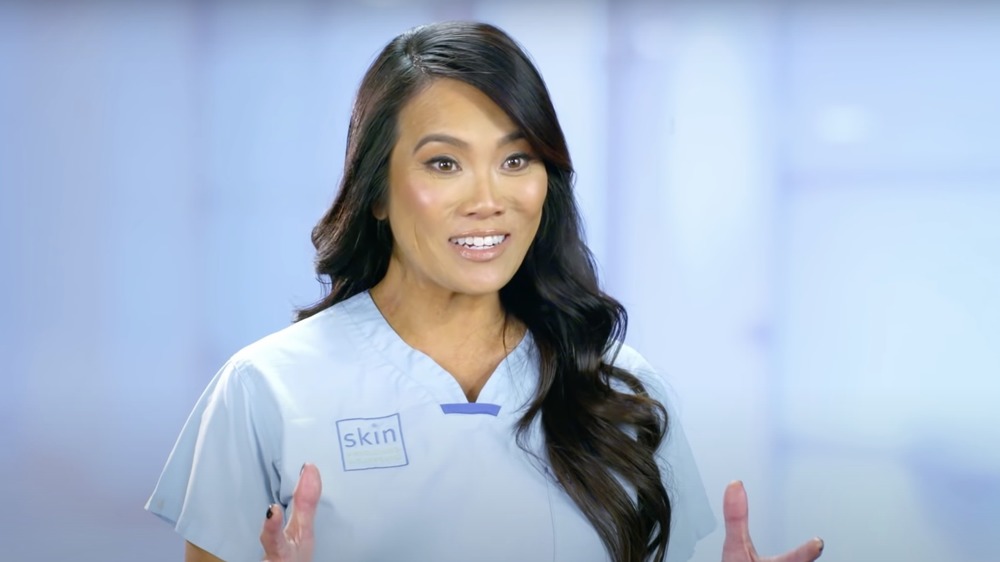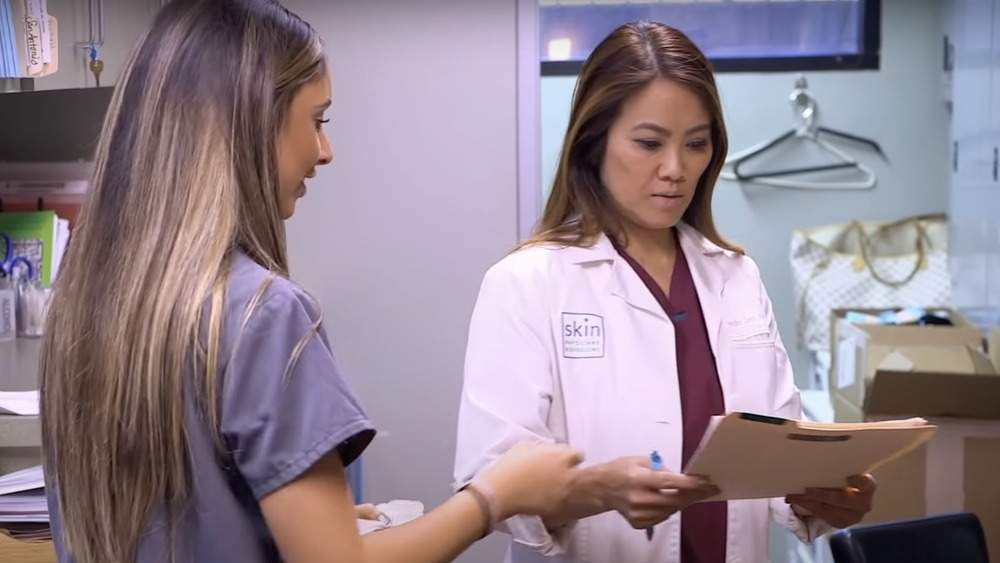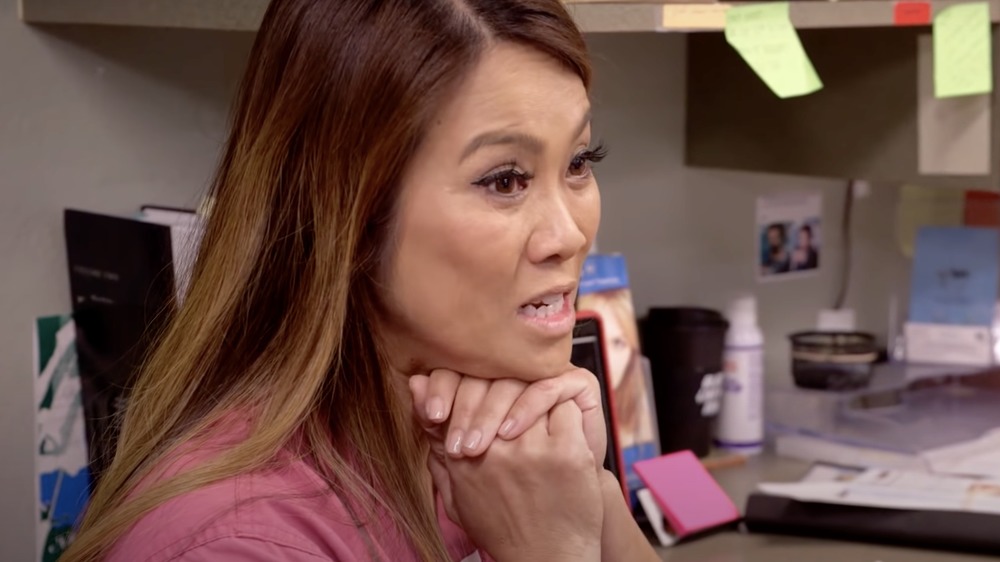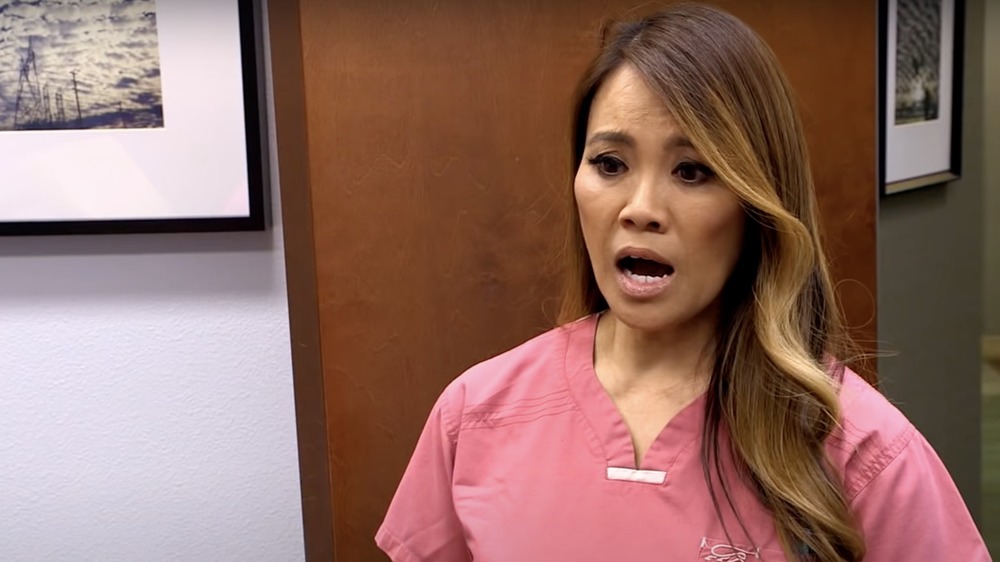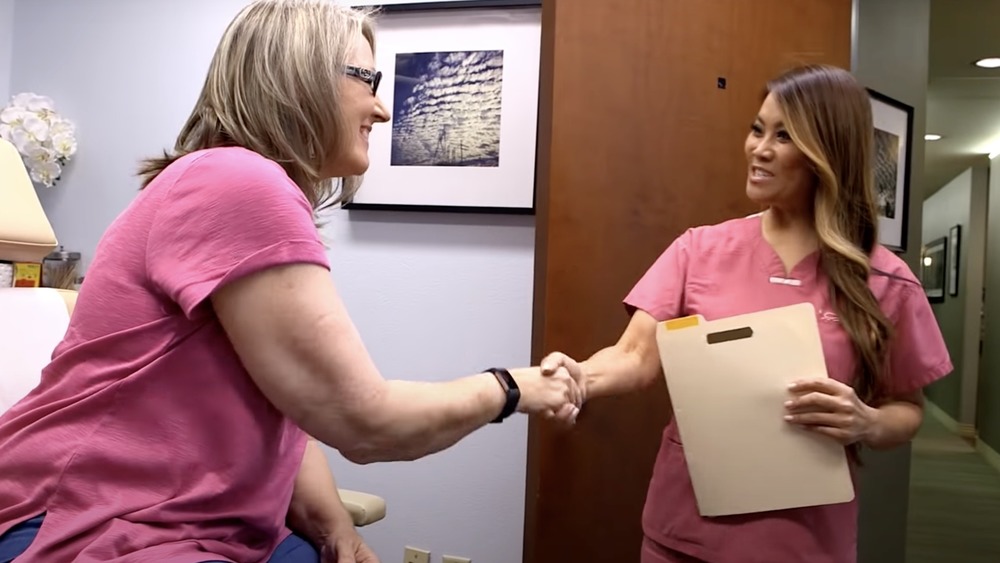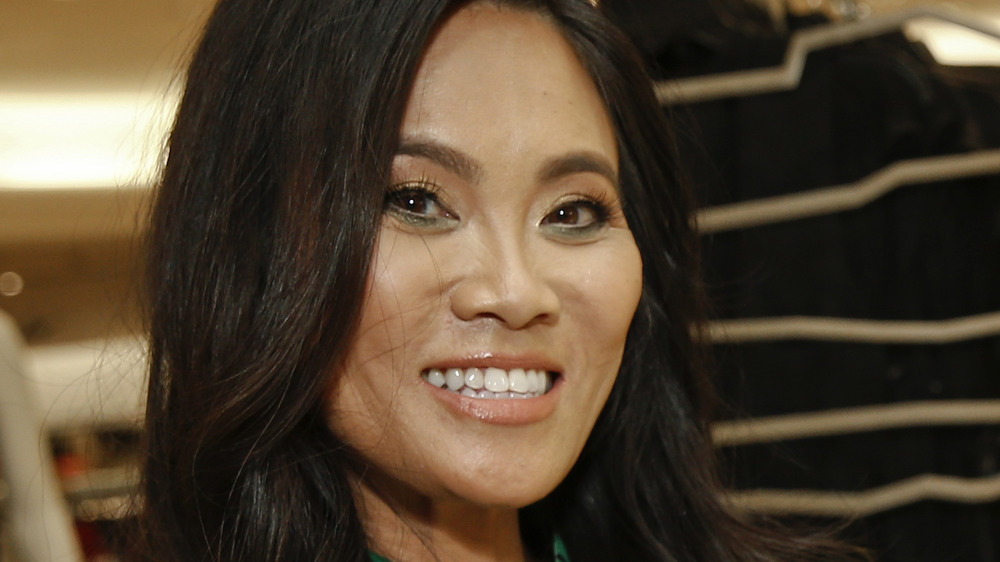Dr. Pimple Popper's Dr. Sandra Lee Talks TV, Fame, And Dermatology - Exclusive Interview
The reality television series Dr. Pimple Popper has been a secret obsession for many of us for quite some time now. Dermatologist Dr. Sandra Lee first popped up on our screens back in 2018 after a pimple-popping video she posted online went viral. What started out as a way to show her Instagram friends her day-to-day life in a dermatologist's office quickly made her a media sensation. Suddenly, the whole world started watching her poke, prod, and pop the biggest and baddest blobs anyone had ever seen on a person's body. Television came calling, a skincare line was created, and even a book was released.
In an exclusive interview with The List, Dr. Pimple Popper talks all about her career — from what makes the perfect pop, what it's like to be recognized while she's out and about, the surprising thing that makes her the most squeamish, and what's next for this skincare superstar.
How Dr. Pimple Popper entered the entertainment industry
What initially made you want to start posting those videos online?
It kind of happened by accident. Really it was that I started to Instagram, and I really thought I wanted to show a window into my world as a dermatologist. It's a really visual field. And early on, I noticed it was, like, people were interested in pimple popping. I posted a blackhead extraction, and people were tagging their friends. And I thought, "That's really weird. Why are people so excited about this video?" So I did it again, and it happened again.
And really through there, I noticed that there was a thing that people really liked to watch. It was really satisfying. It really kind of eased people's anxiety. They were just entranced by it. So I just literally threw another little pimple on the fire just to see how much it would grow, and look what we are doing now. We have a show on Discovery, wonderful social media, and everybody's so supportive. So it's really lovely.
How were you initially approached by the network, first off?
I think, interestingly, I don't think — I was really busy running around, because I have kids and a husband and the social media here and another and a full-time job too as dermatologist, and they just — I think I didn't know if I was going to be very excited about it, because I was a little scared, because I'm in control of my own videos when I post them. But now we have a show, and then there's going to be cameras there, and I'm not really in control of everything, but it's been absolutely lovely.
They've really taken it to another level and made me feel so lucky that I get to do this for people and that I get to see — like I say all the time, I think that dermatologists or any doctor does wonderful things to change people's lives. And I'm just lucky that I get to see it.
What Dr. Pimple Popper says it's like to be on camera
Did it take you a while to get used to cameras being around you in your office?
Yes and no. Yes, of course. You have to get used to them, but I guess I feel really lucky because I have done The Doctors TV show or other little — as a guest dermatologist on news shows, so I already knew a little bit about how to face certain ways or things like that. And I had already gotten used to the sound of my voice, because a lot of us don't like that, and I have my videos on social media, and all I'm doing is talking.
So I know the sound of my voice. So those are probably the things that are off-putting to people in the beginning. And I already had a little bit of experience with that, but, of course, there's always that thought in the back of your head that there are cameras and that the people are watching this. And so, yeah, it's a big deal.
Is there anything that cameras don't show viewers on your show?
Yeah, I think that you can't include everything, I think, but in terms of anything secret? No, not really. Actually, I think what happens is when I see it back, there's a lot of things that I don't see when we're filming. I don't really know how upsetting something is to somebody because when they meet me, they might be nervous already about it.
They don't really tell me, or I don't see the tears, and I don't see the family members or how they make fun of it in their home setting. And for me, when I watch it back, then I'm like, "Wow." I didn't realize what a difference this made actually, what a big deal this was for this person to go through this. So it's more that I don't get to see it until later.
The best part of Dr. Pimple Popper's job
So I guess that brings me to what's the most fulfilling part of your job as a dermatologist?
Oh, everything. I feel really lucky to be in this position right now. I think my husband said it really well a few years ago when I was going to some meeting, some TV kind of meeting, and I was thinking, "Gosh, there's so many things I have to do. I'm just so stressed out," complaining about it. And he said, "You know, you're so lucky that you, in your lifetime here, have one successful job and something that you love, but then you get to pivot and do something that a lot of other people would love to do. And it's really exciting, but actually use that knowledge that you have in your job. You're not completely pivoting to something totally new." And yeah, he's right. That, of course, I'm going to look back at this fondly and just think what an amazing experience that was that very few people get to have.
How did Dr. Sandra Lee get the name Dr. Pimple Popper?
So what's the story behind the name Dr. Pimple Popper? I read that Seinfeld may have had some inspiration.
Yes, actually. Absolutely. And it has to do with, too, when I first started posting, one of the places — one of the early places — I discovered, how I discovered that this was a thing was really that I happened upon Reddit, and I didn't really use Reddit before that. I didn't know how to use it. I'd heard about it, but I didn't know what it was. And so I went onto the subreddit called Popping, which is where everybody — it's a big community, 50,000 people or something. And they share popping videos with each other. I thought, "This is so weird, but I could be their queen." At the same time, I was like, "Wow, this is so crazy." And I had to sign in obviously and post something, and I just noticed that nobody used their name. So I didn't know that you were supposed to be anonymous, but I just thought, "Okay, what kind of name could I think up? Let me go, Dr. Pimple Popper." So, that's where it started. Yeah.
What it's like to be recognized as Dr. Pimple Popper
How does it feel when you get recognized by fans out in public?
It's weird. It's obviously very — I'm so honored, and it's so lovely, and they're all really lovely. They're all so sweet and kind, but it's just weird for me because I don't consider myself to be, you don't really think about that, that people recognize you or people know who you [are] and that usually they say just nice things, that I've done something to — thank me for what I'm doing for my patients or that I really have this show that moves them.
And I just feel like it's weird that I'm — I feel in a way uncomfortable, but also very honored. I don't like to — I'm not the kind of person that really accepts compliments really well. I also feel like it's superstitious. It's not a good thing for me to say, "Oh yeah, thank you. I am this thing," because I'm not. And I think that also helps to ground me too.
No, for sure. You're just out and about. I feel like I wouldn't realize that if I was on TV, because you're just living your daily life.
It's a problem, though, too. Because I tell people, what if you have a wedgie or something, and you can't do anything about it because what if somebody is watching you?
What it's like shooting a reality show
When you're shooting, how many episodes do you shoot? How much time do you spend with patients during the day?
A round of them. Usually we do, when we have to shoot, for the last season we did every month, four days that you shoot straight. And usually I would include the weekend. So Thursday through Sunday. So some of the times you'll see that there's other patients in the office, and sometimes it's pretty empty, and that's because then that's the weekend. And so obviously on shooting days, I'm not seeing any regular patients because it's a long day.
It's from 8:00 a.m. till the evening, till past the time that I would normally do any kind of surgery. So, it's arduous. It's just a different kind of way of working in the office, and yet I'm still seeing patients. It's just a little bit more drawn out. So, there's that. And then there's seeing regular patients. I don't see as many of them because I have fewer hours that I can devote to that, but it's heavy on pimple popping. Certainly.
How Dr. Pimple Popper first discovered dermatology
What made you initially want to become a dermatologist? Tell us a little about your journey to get there.
Well, my dad's a dermatologist. So I was really introduced to it at a young age. It was ingrained in me, I guess, or that it was accepted. I knew what dermatologists did at a young age, because my dad was one, and I had acne. I had atopic dermatitis, which is a form of eczema. I had light skin, I had alopecia areata, I had, like, a loss of skin hair when I was young. And so I knew what these names were, and I knew the kinds of things that you treated. And I knew that was what my dad did.
And so, I think once I realized too, when I went to medical school, that it was a very competitive specialty. It was one that was very desired by a lot of people. That probably lit a little fire under me realizing, "Oh, this is really a good specialty. I should try to see if I can become one." And I'm very lucky to be one now. It's a very small group, a small specialty, and it's just a wonderful one, a fantasy, especially as a female, just because you can have a family and a life, you raise kids and things like that. You need to have the time to do that as well. More so. So it's just a really, really wonderful specialty.
And what has been your most memorable case to date?
There's been so many.
Yeah, there've been so many!
I don't have a single standout for sure. I don't. It's a combination of a really amazing pop, that the pop comes out really cleanly. The better is the one that takes five seconds to do. You know what I mean? But it's enormous or something. That the patient, too, who's so funny, yet charismatic and just really a person that you want to meet after you even just hear their voice. That kind of thing.
No pain, no screaming certainly. Not a lot of blood. Not a lot of messiness. Those are all my favorite kind of pops, and there's a lot of them on the TV show. Let me tell you.
Oh, absolutely.
Yeah. They're amazing, amazing ones, and amazing characters, too. The patients are wonderful.
The surprising thing that makes Dr. Pimple Popper squeamish
I know your show sometimes isn't for the faint of heart. Is there anything that makes you squeamish?
No, it's interesting, because the pops don't make me squeamish, but I don't think about it making me squeamish, too. I think if you've thought about it, it could probably make you feel unwell, but I think we have this block in our mind, all of us do, because I'm very conscious of the patient and making sure that they feel comfortable. And if I ever reacted in a negative way like, "Oh my God, that's gross. Or that smells."
So yeah, I don't get squeamish. We train ourselves really mentally to not do that because it would just be terrible for the patient. How would you feel if it took all your energy, all your trust, and you're so stressed to go see somebody, and then they act like you're gross or something's disgusting about it?
You'd be so embarrassed. I'm more grossed out by other bodily fluids, certainly. And also, I think that's interesting for people to hear that when I cook at home, I barely cook first of all, but when I do, if it's raw chicken breast or raw meat, I don't touch it with my hands. I cannot. I have to wear gloves. I have to wear something just like at work because I think it's too much like the stuff I do at work.
It's weird to touch it. And then on the other hand, and then I could talk about food, I can talk about, this looks like a chicken cutlet, and then we're going to eat chicken for dinner. The opposite doesn't work for me. If I have a cupcake that looks like a pimple, I cannot bite into it without closing my eyes. I can't. I would never eat that. So why would I? I cannot make my — so that's the interesting thing. The power of the mind.
Here's when someone should go see Dr. Pimple Popper
Dermatologists tell us time and time again that we should not pop our own pimples when we're at home. When should someone know that it's time to come into your office for an extraction, whether it be for a pimple or something else?
You know, I feel like in general, if people think about that, they think, "Maybe I should see a dermatologist," they probably should. I think you trust your instinct, especially when it comes to even non-pimples, like moles or strange-looking bumps, that kind of thing. But I absolutely adopt [the idea that] a person should see a dermatologist, if you have severe acne, if you have cystic or nodular acne, or a lot of acne bumps that are deep under the skin, because that has an absolute risk of scarring.
And that's what you're trying to prevent. Because we all know that acne doesn't threaten our lives, but they absolutely threaten your mental strength or your mental fortitude, because scarring can be lifelong and scarring can be very difficult to treat. So you really want to prevent that in the first place.
Absolutely. Yeah, a lot of your patients on the show that come to you, they come to you because I see a lot of them feel very self-conscious about how it's affecting them. Not even threatening their life in any way, but it's just a self-esteem issue.
Right? And that's what dermatology really is too. A lot of it is psychological too, mental. A lot of it is non-life-threatening, but a lot of it is it's like your skin is your armor. It's your shield. It's your way you present yourself to the world. And if that way you present yourself is different or people perceive it as different and you feel left out or you feel very embarrassed about it, it greatly affects your life. There are certainly people from the show that never go outside, never see people because of whatever they have. So that's what I feel really lucky to be a part of.
What's next for Dr. Pimple Popper?
So you have your own television show, you have a skincare line, you have a book, what's next for you, or is there anything that you haven't done that you would like to do one day?
That's enough. That's enough. I think, just let's see where this brings us all. Now we're going to discovery+, so we're going to be streaming there, and all new episodes really starting today, which is very exciting. And there's more content out there too, exclusive content from Dr. Pimple Popper, that is going to be there. And I think I have enough on my plate now, and just seeing, obviously, I didn't know that I was going to be here, and it's so exciting. It's so great really.
The most special thing about what I do now is that I see that I'm having a positive influence on my specialty. I think people realize that we're so much more than just pimple poppers. And also there's all these young people that come visit me. These little 5-year-olds, 7-year-olds, 11-year-olds that come, and they say they want to be a dermatologist when they grow up. That means so much to me, the fact that they know that they can do it and that they have this idea that I can be anything in the world. And maybe this is what — I want to be a surgeon. I want to do these kinds of things and I want to help people in these ways. And it just means so much to me.
You can catch new episodes of Dr. Pimple Popper every week on discovery+.
